Follow-up of MOFA Third-Party Evaluation Results for FY 2017
MOFA follows up on the implementation status of the response actions for the recommendations provided in third-party evaluations. The following presents the implementation status (as of July 2019) of actions in response to the main recommendations obtained from third-party evaluations for FY 2017.
Full evaluation reports are available here
Country Assistance Evaluation of India
Recommendations
It was recommended to define future strategies based on the comprehensive results in the forest resource management sector and to assist in agriculture focused on increasing productivity and value addition. Furthermore, it should be considered to implement environmental and disaster management education and to strengthen cooperation in air pollution control.
Because assistance in the area of “supporting sustainable and inclusive growth” is not as visible as other large-scale infrastructure development projects, creative PR should be employed. Necessary personnel should be assigned to JICA India Office to promote cooperation with local NGOs and private sector as well as to support Japanese companies doing business in India. Considerations based on inclusiveness and sustainability in the infrastructure development sector should be referred in the next revision of the Country Assistance Policy for India.
Implementation status of response measures
Based on the requests from the Government of India as well as the Country Assistance Policy, the implementation of yen loan projects was decided in FY 2018, including “Project for Sustainable Catchment Forest Management in Tripura” to support sustainable forest management and livelihood enhancement activities and “Project for the Dairy Development” to help upgrade cold chains (low temperature-controlled supply chains).
Japan formed training program in Japan, such as “Sustainable Forest Management and Biodiversity Conservation” to share lessons learned and experiences along with knowledge and technology based on Japan’s assistance in the forest sector to stakeholders in each state of India.
In addition to press release, Japanese Embassy is striving for PR by vigorously utilizing Embassy’s Facebook and opportunities of Ambassador’s interviews. JICA is making efforts to further enhance PR through announcing projects on the international days in addition to launching its Facebook in 2019.
Pertaining to expansion of JICA office, the possibility of assigning additional personnel to reinforce SMEs and SDGs business support is under consideration. Japan is also considering setting up a point of contact to strengthen cooperation with local NGOs.
Japan is carefully examining the timing and description of the next revision of Country Assistance Policy.

Sustainable Catchment Forest Management
Project in Tripura: Livelihood enhancement activity for the local residents (weaving)
Photo provided by JICA
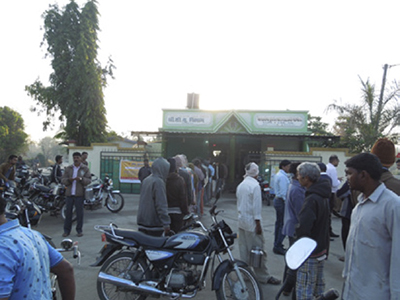
Project for Dairy Development:
Milk collection center. Many dairy farmers sell fresh milk to a cooperative daily.
Photo provided by JICA
Country Assistance Evaluation of the Republic of Uganda
Recommendations
Japan should strengthen its engagement in enhancing policies and systems of Uganda in order to expand projects. It was also recommended to reinforce measures to develop ownership and self-help effort of Ugandan counterparts. Furthermore, exit strategies should be formulated for long-term assistance projects, especially for vocational training, and let Ugandan counterparts take initiatives of management.
Japan should strengthen its local ODA implementation structure, including Japanese Embassy and JICA office, and actively utilize policy advisors. It is also important to find and develop human resources specialized in development cooperation policies.
It was also recommended that Japan should develop and actively utilize human resources knowledgeable about Japan as well as strengthen interaction between Uganda and Japan at multiple levels.
Implementation status of response measures
Cooperation in rural areas was started in 2018 under Ugandan Government’s efforts concerning JICA vocational training program, aiming for its nationwide development. Besides, JICA survey team was dispatched to discuss with Ugandan counterparts in April 2019. Japan has been diligently urging Uganda to transfer management responsibilities for vocational training, taking opportunities of high-level meetings.
The possibility of reinforcing the personnel of Embassy and JICA office is still under consideration. Japan will continue to strive to acquire and develop human resources as well as actively using policy advisors.
In addition to starting to share information on Japan’s economic cooperation to Uganda in the security measures meeting for Japanese nationals, Embassy began delivering its monthly Uganda Newsletter by email to those who wish to receive it.
In August 2018, former students studying in Japan were invited to a farewell ceremony held for participants of the African Business Education Initiative for Youth (ABE Initiative) in order to promote local networking. The Association of Uganda Japanese Scholarship attended the international education fair in Kampala, organized by Japanese universities and they gave presentation on their experiences in Japan. Moreover, Networking Fairs has been held also in Japan for Japanese companies and ABE Initiative participants.
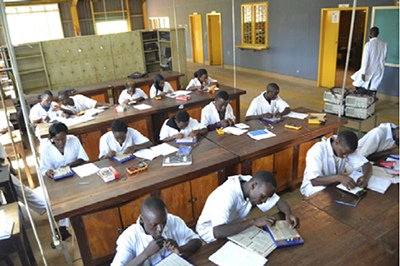
Project for TVET-Leading Institution’s Expansion of Human Resource and Skilled Workforce Development for Industrial Sector: Trainees in the electronics lab for vocational training
Photo provided by JICA
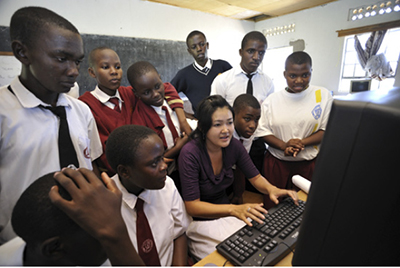
Computer class at St. Mbaaga College in Kakiri, Wakiso
Photo provided by Koji Sato/JICA
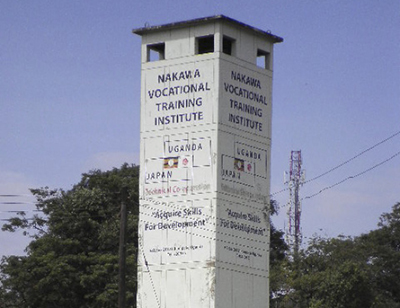
Nakawa Vocational Training Institute
Photo provided by JICA
Country Assistance Evaluation of Cambodia
Recommendations
It was recommended that Japan should continue support for “high quality infrastructure” and simplify and speedup the decision-making and administrative procedures, taking into account a relatively declining Japan’s assistance scale.
To secure aid quality and quantity, the Government of Japan should cooperate with the private sector and donor agencies. Agencies such as the Japan Bank for International Cooperation and the Asian Development Bank are good partners to cooperate as they are capable of making substantial financial contributions.
Japan should provide more opportunities for Cambodians to study in Japan in order to establish tighter bilateral relationship. Enhancement and expansion of ODA are expected for human resource development in various fields such as education and water supply.
Japan should provide support to improve governance proactively, which is capable of distinguishing Japan’s aid from other donors such as China. Further, Japan should expand cooperation through participation of broader strata of citizens such as NGOs, judicial officials.
Implementation status of response measures
To promote Japan’s high quality infrastructure, Japan announced cooperation, at the Mekong- Japan Summit Meeting in October 2018, on the irrigation rehabilitation for agriculture as well as on the construction of electric data interchange system for port control.
Japan is making efforts to simplify and speedup the decision-making and administrative procedures through intimately sharing information with the Government of Cambodia.
The Embassy of Japan and members of the Japanese Business Association have jointly held and will continue to hold public-private committee meetings a couple of times a year to make proposals for improving the investment environment directly to Cambodian relevant ministries. In February 2019, Memorandum was signed between the Ministry of Land, Infrastructure, Transport and Tourism of Japan and the Ministry of Land Management Urban Planning and Construction of Cambodia on the establishment of Cambodia-Japan Platform on the development of infrastructure and urbanization, followed by the first meeting with many Japanese companies attended.
Upon a request from the Government of Cambodia, the Exchange of Notes was signed in May 2018 on the Project for Human Resource Development Scholarship, which is designed to support young Cambodian government officials to study in Japan.
Moreover, young Cambodians who are in the field of politics, judicial and election were invited as part of Japan’s assistance for governance.
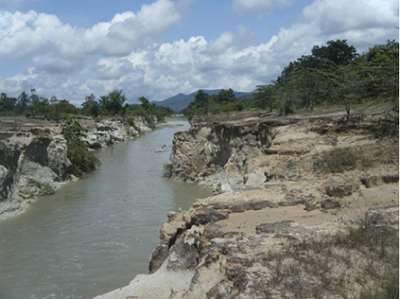
West Tonle Sap Irrigation Rehabilitation Project: Main canal in Lum Hach area (before improvement)
Photo provided by JICA
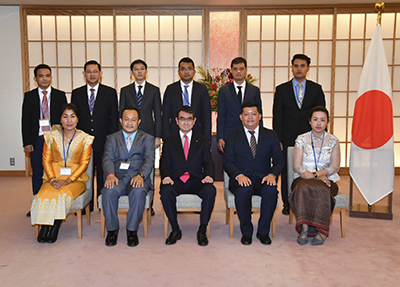
Inviting young politics-oriented Cambodians (Courtesy call on Foreign Minister Kono, December 3, 2018)
Evaluation of JICA Volunteer Program
Recommendations
The program design and management process should be reviewed, including the title “JICA Volunteer Program” and its system.
The position of the “JICA Volunteer Program” should be clarified in Country Assistance Policies and Rolling Plans in the longer term. It should also consider establishing new occupation categories as well as expanding partnerships.
Concerning the “Nikkei Communities Volunteer Program”, efforts should be made to strengthen training on the principles of Nikkei community support, expand the volunteer application requirements to include Nikkei (emigrants of Japanese descent). It was also suggested to strengthen participation in various activities in dispatch destination countries, increase support in Nikkei communities, improve name recognition for Nikkei community volunteers in Japan.
The support system for JICA Volunteer Coordinators as well as JICA volunteers should be enhanced in terms of treatment, respect extended to them.
Implementation status of response measures
Since the word “Volunteer” did not necessarily represent the essence of the JICA Volunteer Program, its Japanese title of the program was changed accordingly. Moreover, program’s category was changed from age division to division by experience and skills. The pre-dispatch training curriculum was reviewed for participants in order to retain necessary knowledge as well as to recognize their role as “grassroots diplomats.”
The format and content of dispatch policy and plan for each country were reviewed to improve consistency with Country Assistance Policy and Rolling Plan. Further, policies were reviewed to promote project formation based on effective partnerships with universities, local governments, and private sectors.
Concerning the “Nikkei Communities Volunteer Program”, PR campaigns were carried out to promote understanding of the Nikkei communities and raise awareness of the program. JICA also participated in the Nikkei community events held by NPOs to encourage Nikkei with Japanese nationality to submit volunteer applications.
The recruitment, selection, dispatch process for JICA Volunteer Coordinators were reviewed. Also, efforts were made to communicate the value of volunteer experience to companies and local governments by increasing report and exchange meetings. JICA established a system that can provide adequate career support in a timely manner by conducting questionnaire surveys to understand the movement of returning volunteers.

Team huddle in a game of volleyball (Laos)
Photo provided by Kenshiro Imamura/JICA

Activity at a seniors care facility (Brazil)
Photo provided by Atsushi Shibuya/JICA
Evaluation of Japan’s ODA to Africa through the TICAD Process for the Past 10 Years
Recommendations
It was recommended that regional projects encompassing multiple countries in the region as well as south-south cooperation between African countries should be fostered to enhance the sharing and transfer of development results across Africa.
Further efforts should be made to reinforce cooperation with other donors, the African Union Commission (AUC) and the United Nations Development Program (UNDP). Moreover, it was suggested to promote TICAD’s namesake projects and facilities for broader recognition.
Accelerating the decision-making process would help increase Japan’s presence in Africa. Therefore Japan should examine how to shorten the time required to make decisions on the implementation of projects in fields specified in the policies as core areas.
Implementation status of response measures
Japan continues to strive for regional and south-south cooperation and is making efforts to include these descriptions as much as possible in the documents for the assistance policy to Africa. For example, the West Africa Growth Ring Master Plan, which Japan supported to formulate, was completed in 2018. Japan has been striving for its implementation in cooperation with relevant countries and other donors.
Japan has been enhancing collaboration with the World Bank, UNDP, and AU on assistance and development to Africa. Preparatory Co-organizer meetings were held for TICAD7, and future cooperation is also being discussed.
Japan will continue to explore suitable projects for promoting TICAD’s namesake projects and facilities. Efforts are made to expedite the implementation of the core TICAD projects, such as yen loan projects.

Water well in Dongol Village (Guinea)
Photo provided by Tatsu Sakamoto/JICA

Buildings in the center of Nairobi viewed from the Nairobi National Park (Kenya)
Photo provided by Shinichi Kuno/JICA

Motor tricycle taxis in the city (Ethiopia)
Photo provided by Takeshi Kuno/JICA
Evaluation on Japan’s Assistance to Connectivity in the Mekong Region with a Focus on Southern Economic Corridor
Recommendations
It was recommended to integrate Mekong-Japan regional cooperation policy by reinforcing collaboration between MOFA and other ministries and agencies of Japan and clearly explain the aims and methods of the policy to each Mekong region country.
It is necessary to verify Japan’s development policy priorities based on the development policy and needs of each Mekong country, and implement development cooperation linked to enhancement of international competitiveness.
Japan should aim to revitalize the regional economy through continuing support that leverages the special characteristics of each country as well as institution building.
It was also recommended to strengthen connectivity in the Southern Economic Corridor and demonstrate Japan’s initiatives in supporting the Mekong region.
It is necessary to continue assisting Mekong country with policy formulation and institution building by dispatching long-term experts, as well as promote regional collaboration through triangular cooperation that leverages each country’s field of expertise.
Implementation status of response measures
MOFA closely cooperated with other ministries and agencies of Japan during the coordinating process of the “Tokyo Strategy 2018 for Mekong-Japan Cooperation” adopted at the 10th Mekong-Japan Summit Meeting in 2018. Japan carefully explained the direction of Japan’s assistance to each Mekong country through summit meetings etc.
In the “Tokyo Strategy 2018”, Japan specified more than 100 possible Mekong-Japan Cooperation projects that would serve to realize the Ayeyawady-Chao Phraya-Mekong Economic Cooperation Strategy (ACMECS) Master Plan, led by Thailand. Japan will contribute to sustainable industrial development in the Mekong region through the steady implementation of these projects.
The “Tokyo Strategy 2018” sets out three pillars, (1) Vibrant and Effective Connectivity, (2) People-Centered Society, and (3) Realization of Green Mekong. In order to realize the Vibrant and Effective Connectivity, Japan continues to support in accordance with the Strategy, identifying issues and countermeasures respectively for hard connectivity, soft connectivity, and industry connectivity.
Also, in the “Tokyo Strategy 2018”, the “Free and Open Indo-Pacific (FOIP)” initiative is shared to strive for strengthening regional connectivity. Furthermore, the “Mekong-Japan Initiative for SDGs toward 2030” is being formulated based on the Leaders’ decision and Japan is taking its initiative.
Japan continues to support the capacity development of legal sector by dispatching longterm experts through JICA’s technical assistance and to implement training programs in Japan, including JICA knowledge co-creation program. Moreover, support to the Mekong region has been enhancing through the implementation of triangular cooperation with Thailand based on the partnership agreement between JICA and Thailand International Development Cooperation Agency (TICA).

View of central Bangkok from a skyscraper (Thailand)
Photo provided by Shinichi Kuno/JICA

Project for Harmonized, Practical Legislation and Uniform Application of Law:
Seminar held at the Hai Phong Prosecutor office (Vietnam)
Photo provided by JICA
Evaluation of Individual Project under Grant Aid
1 Emergency Grant Aid for the Project to Implement Emergency Measures in Response to the Influx of Syrian Refugees (FY 2013 Jordan)
Recommendations
The project scope should be clarified according to each purpose of emergency and humanitarian assistance and development assistance. MOFA should also enhance its function to ensure the relevance of project scope in the project planning stage.
The discussion record of changes to project process should be preserved. Appropriate PR should be implemented and it is desirable to report back to Japan on the operation and maintenance conditions of equipment from the recipient country.
Implementation status of response measures
More efforts are being made to define the urgency of the project when considering a new project. Furthermore, MOFA is striving to form and implement the most effective assistance without duplication, based on well coordination with the Embassy of Japan and international organizations local office or office in Japan.
The records of the review process are stored appropriately. MOFA continues to preserve the records thoroughly.
MOFA has been actively implementing PR about Japan’s assistance for Syrian refugees, utilizing MOFA’s website and opportunities at international conferences.
Attention is paid to make a mechanism for enhanced collaboration with project executing agencies, considering monitoring, management after delivery and proper PR for Japan’s aid.
2 Non-Project Grant Aid (FY 2014 Palestine)
Recommendations
Further collaboration between MOFA Headquarters and the Overseas Establishments is critical for timely submission of project completion reports. It is also essential to compile examples of the use of counterpart funds as office references as well as to implement PR proactively in both Japan and the recipient country.
Implementation status of response measures
The project completion report or a progress report has been submitted almost without delay by making frequent inquiries to Palestine. Palestinian counterparts have realized that the report submission is a prerequisite for approval of new projects.
This case has been introduced in training for newly assigned personnel of the International Cooperation Bureau of MOFA as an example of good practice (excellent implementation) of counterpart fund projects in economic cooperation.
MOFA continues to actively promote PR, such as timely posting information on websites of Overseas Establishments.
